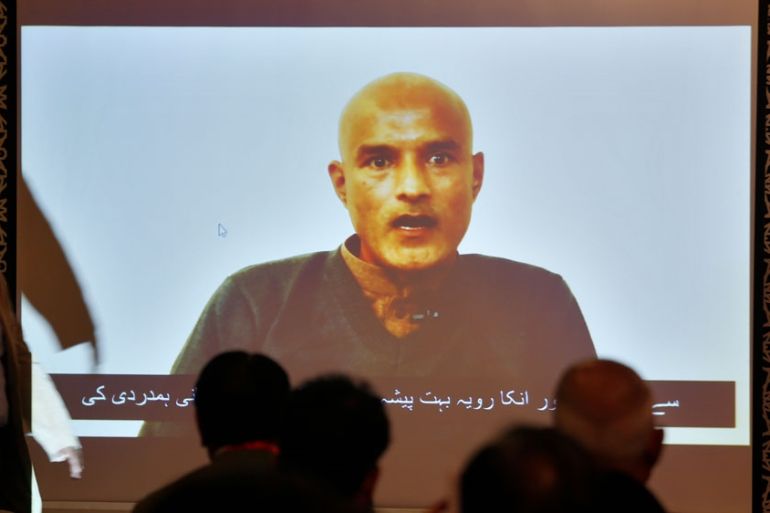Indian official meets detained Indian ‘spy’ Jadhav in Pakistan
Indian FM spokesperson term’s Pakistan judicial process ‘farcical’ after official’s meeting with convicted spy.

Islamabad, Pakistan – India’s Deputy High Commissioner has met Kulbhushan Jadhav, an Indian national convicted and sentenced to death for espionage by a Pakistani court, in line with an International Court of Justice (ICJ) ruling.
The Indian foreign ministry spokesperson Raveesh Kumar confirmed that Gaurav Ahluwalia’s meeting with Jadhav took place on Monday with Pakistan’ foreign ministry adding that the meeting lasted two hours.
“Today’s consular access is a part of the binding obligations of Pakistan, as ordered by the ICJ, to ensure effective review and reconsideration of the conviction and sentence awarded to Shri Jadhav through a farcical process,” said Kumar.
He added that Jadhav “appeared to be under extreme pressure” to repeat Pakistan’s version of events regarding his activities in the country.
Indian officials had earlier rejected a meeting offer in August, arguing that they were not being given unfettered access to the Indian citizen, as mandated by the Vienna Convention on Consular Relations.
Jadhav, a former Indian navy officer, was arrested by Pakistani authorities in the southwestern province of Balochistan in March 2016 and charged with espionage. Pakistan released a video that appeared to show Jadhav confessing to facilitating attacks in Balochistan province.
Following a trial behind closed doors by a Pakistani military tribunal, Jadhav was convicted of espionage, sabotage and terrorism. He was sentenced to death in April 2017.
India contested at the ICJ that Jadhav was an innocent civilian who did not receive a fair trial, and was denied consular access as required under the Vienna Convention.
Pakistan argued the convention did not apply in cases where a foreign national was conducting espionage.
Jadhav was allowed to meet his mother and wife in December 2017.
Judgement rejected
In July, after months of deliberations, the ICJ ruled that Pakistan had violated the Vienna Convention by not allowing Jadhav access to Indian officials.
The judgment, however, rejected the Indian demand that Jadhav’s conviction by a military court be dismissed, calling instead for the verdict to be reviewed in light of the ICJ’s ruling on the consular access violation.
“The Court therefore concludes that Pakistan has breached the obligations incumbent on it under … the Vienna Convention, by denying consular officers of India access to Mr Jadhav, contrary to their right to visit him, to converse and correspond with him, and to arrange for his legal representation,” said ICJ President Abdulqawi Ahmed Yusuf while delivering the July verdict.
The convention was applicable “regardless of the allegations that Mr Jadhav was engaged in espionage activities”.
Tensions between the nuclear-armed South Asian neighbours have been at fever pitch since India last month revoked the special constitutional status of Indian-administered Kashmir, a region at the heart of a 72-year dispute between the countries.
Pakistan and India have fought two of their three wars of Kashmir, which both claim in full but administered separate portions of.
On August 5, India revoked Article 370 of its constitution, which accorded Indian-administered Kashmir, a Muslim-majority state, special rights including the right to its own constitution and autonomy to make laws on all matters except defence, communications and foreign affairs.
Pakistan rejected the move, saying India was attempting to absorb Kashmir into its territory, in violation of United Nations resolutions that have ordered a plebiscite to be held in the mountainous territory to decide its fate.
Pakistani Prime Minister Imran Khan has since accused Narendra Modi, his Indian counterpart, of being the head of a “fascist and racist” government.
Reporting by Asad Hashim, Al Jazeera’s digital correspondent in Pakistan. He tweets @AsadHashim